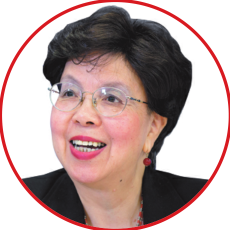
Aug 21, 1947, in Hong Kong
EDUCATION:
1973: Bachelor of Arts, home economics, Brescia University College
1978: Doctor of Medicine, University of Western Ontario
1985: Master of Science, public health, National University of Singapore
CAREER:
1978-89: Medical officer, Hong Kong Department of Health
1989-92: Assistant director, Hong Kong Department of Health
1992-93: Deputy director, Hong Kong Department of Health
1994-2002: Director, Hong Kong Department of Health
2003-05:Director, department for protection of the human environment, World Health Organization
2005-06: Assistant director-general for communicable diseases, WHO
2007-17: Director-general, WHO
2018-present:Member of the National Committee of the Chinese People's Political Consultative Conference
Focus on health the right prescription
At the UN General Assembly in 2015, President Xi Jinping announced the creation of a $2 billion fund, which will be raised to $12 billion by 2030, to support least-developed countries and launch 600 specific projects to cut poverty, improve education, and support better healthcare.
At the 19th National Congress of the Communist Party of China in October 2017, Xi also emphasized making efforts to ensure that all Chinese people can enjoy happier, safer and healthier lives, Chan said.
"This is an exceptional formal recognition of the political power of health, and bodes well for China's leadership, at home and abroad," she said.
"China is extremely fortunate to have leadership that has made health the center of all government policies. All policies made in all government sectors need to include a health impact assessment."
Chan said that enabled China to ensure that the consequences of its rapid modernization and economic progress made people healthier, not sicker.
Chan, 71, still wants to share China's experience in health promotion and her own. She is now a member of the council of advisers of the Boao Forum for Asia, and is busy preparing for the first Global Health Forum this year.
"In a world facing considerable uncertainty, international health development is a unifying and uplifting force for the good of all humanity," she said.
Chan said that as China develops its Belt and Road Initiative, "I suggest many countries keep in mind the many economic and trade-related factors that can so quickly undo decades of steady progress in improving health. Acknowledging and addressing these factors is another way to promote peace and cooperation, openness and inclusiveness, mutual learning and mutual benefit."
Chan was given a new role last year as a member of the National Committee of the Chinese People's Political Consultative Conference, the country's top political advisory body.
"As a new member, I have to listen and learn," she said. "There is so much to learn about playing the role of a CPPCC member."
She said her role has transformed to serving China.
"As former director-general of the WHO, I was an international servant, and I did not wear my nationality on my sleeve," Chan said. "It has been a great honor to serve the WHO, but without my motherland's support, I wouldn't have the opportunity to do so."


